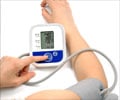
‘Blood pressure levels measured at a clinic may not accurately reflect levels that a person experiences at home, work or while asleep. ’
Tweet it Now
Using data from the Jackson Heart Study, which is designed to identify CVD risk factors among African American individuals, this analysis included 1,034 adults who had average daytime and nighttime BP levels calculated based on measurements from a BP monitor on their arm that took readings every 20 minutes during a 24-hour period. During follow-up there were 113 CVD events (including coronary heart disease and stroke) and 194 deaths. The authors report that individuals with higher levels of daytime and nighttime systolic BP had an associated increased risk for CVD events and death, independent of BP levels measured in the clinic.
The increase in CVD risk was larger among participants not taking BP medication. A limitation of the study to consider is that 24-hour BP monitoring was performed only once among participants, and the researchers were unable to assess whether changes in daytime and nighttime BP during follow-up were associated with outcomes.
Authors: Yuichiro Yano, M.D., Ph.D., Duke University, Durham, North Carolina, and coauthors. (doi:10.1001/jamacardio.2019.2845)
Editor's Note: The article includes conflict of interest and funding/support disclosures. Please see the article for additional information, including other authors, author contributions and affiliations, financial disclosures, funding and support, etc.
Advertisement















